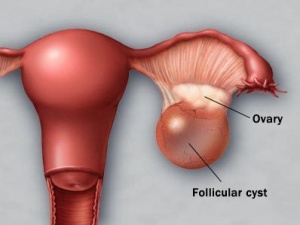Early Detection and Prevention of Ovarian Cysts

Ovarian cysts are generally a benign problem for women. However, even though they don’t represent a health hazard, early detection and prevention of ovarian cysts is important in order to prevent complications in the future.
What are cysts?
An ovarian cyst is a small fluid-filled sac that forms inside or outside a woman’s ovary.
They occur when a woman is in the process of ovulation: a small follicle forms on one of the two ovaries, and is broken when the egg matures and is ready for fertilization. After the egg releases, this small sac dissolves and the body reabsorbs it naturally.
However, if for some reason the sac persists after the egg releases, it may fill with fluid, grow larger, and form a cyst.
These cysts usually occur during the years between puberty and menopause, and after menopause are quite uncommon.
What causes cysts?
A woman is at an increased risk of developing ovarian cysts if she has irregular menstrual cycles, is subjected to fertility treatments, or has hormonal imbalances or other genetic factors.
How do they detect ovarian cysts?
Usually, ovarian cysts do not have alarming symptoms. However, in some cases, a woman may notice them due to a sharp pain in the abdomen during certain activities.
If the cyst begins to bleed or ruptures, it causes intense pain. If this is the case, the woman should see a doctor quickly, as this can lead to vaginal bleeding.
Another way they are discovered is from experiencing pain right before the period starts, or during sexual intercourse.
Also read:
Causes of Right Abdominal Pain
Other symptoms that may indicate the presence of an ovarian cyst are:
- Nausea or vomiting
- Breast tenderness
- Weight gain
- Problems with urination
- Swelling in the abdomen or pelvic region
- Pain in the lower back or thighs
- A combination of pain, fever, and vomiting
If you experience any of these symptoms, it’s important to consult a doctor. He or she will perform a pelvic exam to confirm if there are cysts on the ovaries.
If they suspect this is the case, they may confirm it with an ultrasound or an MRI. Additionally, a blood test can help determine if the cyst needs removal or not.
Doing this all early is important for the prevention of ovarian cysts.
How to Prevent Ovarian Cysts
Prevention of ovarian cysts is crucial. Here are some recommendations for you that you can easily do at home:
Maintain a healthy diet

In order to guarantee the early detection and prevention of ovarian cysts, your diet should include more foods that are rich in fiber and water. This reduces abdominal pressure.
However, in addition to this, it’s a good idea to also add foods that have high levels of vitamins and minerals, especially zinc and vitamins B and C.
Warm compresses
When you’re experiencing abdominal pain, a warm or hot compress can reduce swelling and reduce the level of discomfort.
Drink relaxing herbal teas

When you’re experiencing symptoms like abdominal swelling or pain, it’s best to drink a tea made with chamomile, mint, or raspberry.
These teas help ease stress and have a calming effect, making them ideal before bedtime.
You might be interested in:
The 5 Best Teas for Peaceful Sleep
Drink lots of water
A habit as simple as drinking plenty of water can help prevent the formation of ovarian cysts because it keeps you well-hydrated. It’s recommended that you drink at least 8 glasses of water every day.
Dandelion tea

Dandelion is known for itsdiuretic properties that help detox the liver, eliminate toxins, and improve hormonal balance. Bearing that in mind, dandelion tea is great for helping to reduce and prevent the formation of cysts on the ovaries.
Get regular exercise
Exercising regularly helps regulate your body’s hormonal cycle, prevent abdominal pain, and improve your overall health. It’s been shown that women who are physically active tend to have fewer irregularities in their menstrual cycle, and this helps reduce the formation of ovarian cysts.
This text is provided for informational purposes only and does not replace consultation with a professional. If in doubt, consult your specialist.








